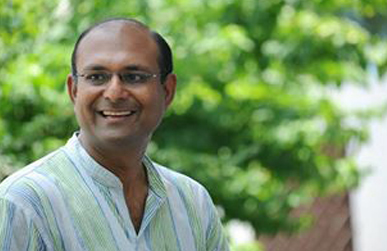Read in : தமிழ்
While this year’s IIT JEE results indicate that Tamil Nadu may be tuning in to the national trend of plugging into entrance examinations, this trend may not always have positive consequences, warns Balaji Sampath, founder and secretary of AID India and AhaGuru.
Speaking to inmathi.com, Dr. Sampath says that Tamil Nadu is now among states with the most applicants for NEET, in part due to the publicity it has received from the DMK ‘s vociferous opposition to it. And that interest has rubbed off on JEE, too, he says, adding that the declining interest of Tamil Nadu students in JEE seems to have been reversed.
How do you link the growing interest in JEE with NEET?
Yes, we do see more and more students are getting into preparing for JEE, especially state board students. The change in state board syllabus has helped. Tamil Nadu also tops in NEET participation. More students from here write the test than other states. In my opinion, the public discourse that NEET is tough and beyond the average student has made it appear to be a challenge that students are willing to take!
Many of the students who write NEET are not really interested in medicine. Since the level of preparation for JEE and NEET is somewhat similar, some of them are taking IIT JEE. In terms of performance, Tamil Nadu is still behind in percentile unlike say Telangana or Rajasthan.
In Telangana and AP, for instance, they anyway have to take EAMCET for engineering, agriculture and medicine. So JEE is just one other exam for the students.
Dr. Sampath says that Tamilnadu is now among states with the most applicants for NEET, in part due to the publicity it has received from the DMK ‘s vociferous opposition to it, and that interest has rubbed off on JEE, too,
But you don’t think Tamil Nadu needs to catch up on the percentile scores?
We should improve the performance of our students. But in Telangana, AP, Haryana or Rajasthan, they have these dummy schools. Starting from Class 6, students sign up on one of these dummy schools. They put their name there but attend only coaching classes. The purpose of attending a school is lost.
So from Class 6, the students are taught to crack multiple choice questions. And they get 100 percentile in IIT JEE. Unfortunately, the student who comes out of this system is a single dimension person. They sometimes can’t form a single sentence, can’t think in complete sense. They know questions, techniques and ABCD options, little else. They typically have low confidence and are unable to articulate their thoughts. They don’t have school or peer exposure.
Also read:
Puducherry students get a helping hand from Sunday Market vendors
Tamil Nadu Engineering Admission: Case for single-window
Even in JEE now, some questions need a numerical answer and are not multiple choice. These questions require some calculation. The students are finding this tough.

“Many of the students who write NEET are not really interested in medicine. Since the level of preparation for JEE and NEET is somewhat similar, some of them are taking JEE” — Balaji Sampath founder and secretary of AID India and AhaGuru
On that score, we are better off in Tamil Nadu…
Yes, that culture has not really started in Tamil Nadu. In our own coaching classes, we have at least 20 students in the high 99 percentile range. But this is good enough.
But we are starting to see such coaching class-type schools in Chennai, too, where instead of a school campus, it’s just an apartment building where children learn to crack exams. NEET repeaters are a part of this trend.
As a country this system is going to cause a lot of trouble.
Now that the state is coming up with its own education policy as a counter, what do you advocate?
We had devalued maths and science learning. A student who didn’t know simple algebra could have passed Class 10. We watered down the system so much. But the college entrance system that the Union government is promoting has ramped up the standards so much. There is a massive gap as a result.
Even in IIT JEE now, some questions need a numerical answer and are not multiple choice. These questions require some calculation. The students are finding this tough.
The state government responded in the past by not having entrance exams and made school education far too simple. Now, they can continue to keep the no-entrance policy for colleges within the state but push for quality in schools.
The syllabus has been upgraded somewhat. In any case, most textbooks across the country are based on NCERT, so there’s some uniformity in standards.
In the past, the blueprint system for questions was followed. In this, blueprints were given that had specific question paper sets, say four or five, from which questions would be asked. Students can simply memorize them and get good scores. Now they have done away with the blueprint but still stick to what are called book-back questions. These are questions that apply the syllabus and are often at the end of each chapter or at the back of the book.
I have served in curriculum committees and other panels and asked for at least 10% of questions to be from outside the book. But there’s much resistance to this. Our question papers have to upgrade and, in turn, the infrastructure and teaching methods. Tamil Nadu can be in a good position then and also serve as an alternative to the mad rush into entrance exams to compensate for poor quality schools.
Read in : தமிழ்











